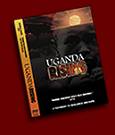|
|
||||
|
|
by Geoffrey D. Roberts  In Uganda Rising, viewers are reminded that when rebel leader Yoweri Museveni rose to power as President of Uganda in 1986, people were hopeful and felt that he represented a “new breed of African leaders.” Since that time, he received support from the Western world and praise across the world for instituting an HIV education program. However, despite Museveni's accomplishments, a brutal war that started 20 years ago between his government and the Lord’s Resistance Army (LRA) led by Joseph Kony wages on. Kony believes in a regime founded on the ten commandments and that he is a prophet guided by a spirit world. There are some who think Kony actually possesses supernatural powers. We learn in this documentary that LRA's membership is 80% children. These youngsters are abducted from their homes and forced to commit violent acts, including murder, against others -- even their own family members. Those as young as 13 are thrown into combat. Twenty-five thousand children, mostly of the Acholi people have been abducted. and 1.5 million people have been displaced thus far, with 90% of the Acholi people in camps. One thousand of them die each week. Museveni has put these displaced individuals in camps, but they have not been supplied with the bare essentials needed to survive. The government’s goal is to fight until the LRA is completely destroyed. Ironically, Kony is an Acholi but is adamant that he will fight until the last breath is choked out of him. His one and only agenda is to terrorize his own people. Sadly, peace talks have failed between both sides. Deaths in Museveni’s camps are exceeding the amount of people killed by the LRA. And it doesn't help matters that the UN has had trouble making itself seen as an authority. However, at the urging of Museveni, the International Criminal Court has now indicted Kony and four other top LRA members for criminal acts against humanity. Will peace be restored or will the situation escalate higher? Uganda Rising shows viewers the hardships children face. Many have seen parents and siblings killed before their eyes and/or were forced to kill others. Some have had to quit school to survive and raise their siblings after their parents were killed. One woman's lips and ears were cut off. In order to learn how to hold and operate a gun, trainees were given orders to stand on opposite sides of one another and start shooting at each other, resulting in casualties on both sides. We also see the “night commuters,” who are children walking miles and miles away from home in the dark to reach safe havens so they will not be abducted during the night. This disturbing documentary contains several key interviews. Among them are: Mahmood Mamdani, the Herbert Lehman Professor of Government and Anthropology, School of International and Public Affairs, Columbia University, who understands the political climate in Uganda as he hails from Kampala, Uganda, and has authored 13 books; Samantha Power, a Professor of Practice in Public Policy, Carr Centre for Human Rights Policy at the Kennedy School of Government at Harvard; The Honorable Lloyd Axworthy. former Canadian Policy Minister from 1995-2000; Betty Bigombe; and Noam Chomsky. Amnesty from prosecution has caused some members of the LRA to leave that group. Even though they were involved in mass murder, they are forgiven in a cleansing ceremony. The public ceremony consists of traditional gift giving, and the private ceremony is where confessions are made and the subjects repent. Uganda Rising, co-directed by Jesse James Miller and Pete McCormack (who also wrote the film), is meant to shed light on what remains a hidden war and a hidden problem. The film’s goals focus on bringing into clear view the crisis Uganda still faces. Dignitaries, including UN Secretary General Jan Egeland and other international representatives, met the week of May 4th to address the 20-year war in Uganda. If Uganda Rising helps bring forth a resolution to this serious situation, the film has more than done its job. Uganda Rising had its World Premiere on May 4, 2006, as part of the Canadian Spectrum Series at Hot Docs: Canadian International Documentary Film Festival. For information on the additional screening scheduled for May 6th or on other dates, visit www.ugandarising.com. (Released by MindsetMedia; not rated by MPAA.) Review also posted on www.movie-critiques.com. |
||
|
© 2026 - ReelTalk Movie Reviews Website designed by Dot Pitch Studios, LLC |



